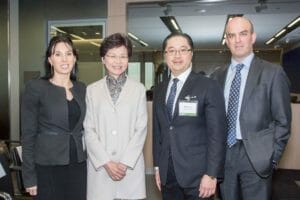Top Story
ULI Hong Kong’s WLI Chapter Launches with Robust Discussion of Strategies for Career Advancement
April 27, 2016
Letting go of the pursuit for perfection, speaking up in the workplace, and developing strong relationships with mentors were among the strategies for success that women real estate leaders shared at a discussion on the gender gap within the real estate industry in March that served to launch the Women’s Leadership Initiative (WLI) chapter in Hong Kong.
The event was a milestone for WLI, bringing the total number of chapters in ULI’s district and national councils around the world to 30.
In her opening address, Carrie Lam, the chief secretary for administration of the Hong Kong government, noted the long relationship that she has enjoyed with ULI. She also made light of Margaret Thatcher’s famous remark, “If you want something done, ask a woman,” noting that if that was true, she would be in “in deep trouble” since she is the only female principal official in the Hong Kong government.
Lam expressed optimism about women playing a greater role within Hong Kong real estate and the unique position WLI has in connecting and supporting them. “With so many exciting projects going on here in Hong Kong and a fantastic pool of women leaders in the industry, I’m sure the WLI will have a great start in embracing inclusivity in leadership roles for women,” she said.

Ms. Carrie Lam (second from left) pictured with ULI North Asia Chairman Raymond Chow and ULI Asia Pacific Chief Executive John Fitzgerald.
Lam’s speech was followed by a presentation by Denise Tan, director and cofounder of Christine Capital, who reminded the audience of the WLI’s mission—to raise the visibility and number of women in leadership roles in the real estate and land development industry. She presented findings from Women in Leadership in the Land Use and Real Estate Industry, a research study conducted by the global WLI on the state of women in leadership roles within real estate based upon a comprehensive survey of more than 1,200 female ULI members from the United States.
One of the survey’s key findings is that females make up 25 percent of ULI members in the United States, but among ULI’s members who are CEOs, only 14 percent are women. Of these women, 93 percent are leading firms with fewer than 100 employees. “It’s rare that women are leading organizations and when they are leading organizations, they are small organizations,” Tan said.
The report suggested several strategies to overcome the gap in gender equality, which include a mix of formal and informal approaches. Formal approaches, which are more policy driven, include training and development, human resource practices, and workplace flexibility, while informal policies are more about daily work life, and include encouraging women to take on challenging job assignments and promoting workplace coaching by mentors and senior leaders.
“The most effective steps that organizations can take is a blend of informal and formal approaches and start changing how work is done on a day-to-day basis,” Tan said.

The panel of high-performing women in real estate shared their experiences balancing career advancement with family responsibilities.
Four women who have made it to the top of their industry took part in a panel discussion, moderated by Richard Price, CBRE Global Investors Asia’s CEO and ULI board member and trustee. Louise Kavanagh, director, fund manager at Invesco Real Estate, stressed the importance a good mentor made to her career progression. “When I came to Asia in 2007, I had a very strong advocate who helped me progress through the organization, pushing me into leadership roles, allowing me to show my strengths.”
Ariel Shtarkman, founder of Orca Capital and a senior content advisory with ULI, agreed on the importance of advocates. “I’ve had amazing mentors throughout my career both internally and externally, who guided me,” she said. “I find that networking, especially as a startup, is crucial for success.”
Some panelists said that women may be holding themselves back by not speaking up and making their needs known. Mabelle Ma, director, development and valuations at Swire Properties, said combining a family and a career was a struggle for her. “I thought about resigning when my son was young because of my difficulties in managing a work/family balance,” she said. “But there is a way out. You have to be open with your company and let them know that you are struggling. You have to learn to say no—to your company, and sometimes to your kids.”
Women aiming for perfection with men being happy with “good enough” was another theory the panel offered on why women do not advance as quickly as men. “I think men are okay with their work being ‘good enough,’ which allows them time to go off and network,” Price suggested.
One of the final insights over women opting to step back when they have families came from Carol Kim, senior managing director, investor relations and business development at Blackstone. She believed that women who want families need to look at their career as a long game. “My career has not taken a straight and predictable path,” she said. “I took certain side steps because of family. But I see my career as a long game, and ultimately, as the report shows with the salary gap disappearing when men and women are at the later stages of their career, we get there in the end.”
Reporting provided by BlueCurrent Group, a public relations firm based in Hong Kong.